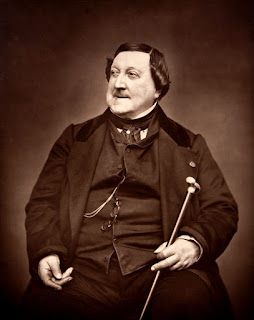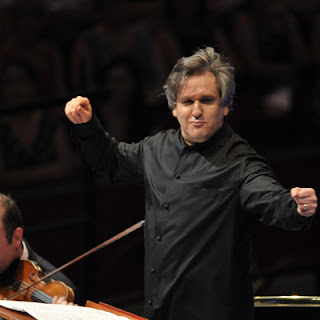Information
Composer: Gioachino Rossini
Anna Netrebko, soprano
Joyce Didonato, mezzo soprano
Lawrence Brownley, tenor
Ildebrando D'Arcangelo, bass
Orchestra e Coro dell'Accademia Nazionale di Santa Cecilia
Antonio Pappano, conductor
Date: 2010
Label: EMI
http://www.warnerclassics.com/release/550718,5099964052922/pappano-antonio-rossini-stabat-mater
- Stabat Mater: Stabat Mater dolorosa
- Stabat Mater: Cujus animam gementem
- Stabat Mater: Quis est homo
- Stabat Mater: Pro peccatis suae gentis
- Stabat Mater: Eja, Mater, fons amoris
- Stabat Mater: Sancta mater, istud agas
- Stabat Mater: Fac, ut portem Christi mortem
- Stabat Mater: Inflammatus et accensus
- Stabat Mater: Quando corpus morietur
- Stabat Mater: Amen. In sempiterna saecula
Anna Netrebko, soprano
Joyce Didonato, mezzo soprano
Lawrence Brownley, tenor
Ildebrando D'Arcangelo, bass
Orchestra e Coro dell'Accademia Nazionale di Santa Cecilia
Antonio Pappano, conductor
Date: 2010
Label: EMI
http://www.warnerclassics.com/release/550718,5099964052922/pappano-antonio-rossini-stabat-mater
----------------------------------------------------------------------------
On a trip to Spain with his friend Alejandro Aguado in 1831, Rossini was disconcerted to discover that the Archdeacon of Madrid wished to commission a new work, suggesting a Stabat Mater . Because the Archdeacon was a close friend of Aguado, Rossini reluctantly agreed to compose the piece, with the provision that the Archdeacon have no right to sell or publish the work. After completing sections 1 and 5–9, Rossini lost interest in the work and asked his friend Giovanni Tadolini to complete it. This composite work was premiered in 1833. When the Archdeacon died in 1837, the manuscript was sold and eventually purchased by the Parisian music publisher Aulangier. Rossini eventually recovered the manuscript and composed sections 2–4 in place of Tadolini’s work as well as adding a final “Amen.” The revised work was premiered in 1841, with Donizetti conducting. The music is of high quality, although some sections do not quite reflect the sorrowful nature of the text.
Pappano conducts the Stabat Mater like the glorified operatic music that it is, highlighting the drama and emphasizing the theatrical nature of Rossini’s inspiration. The “Inflammatus” (track 8) sounds like a precursor of the Dies irae from Verdi’s Requiem. Pappano keeps tight control of the chorus and orchestra, which both perform wonderfully for him.
The soloists are very impressive. I have not heard much of Anna Netrebko’s work, and I was expecting a brighter tone than the dark quality she exhibits here. She occasionally sounds a little uncomfortable in her low-lying role. I don’t want to overemphasize this, however; her contribution is a positive one. About the remaining soloists I have no reservations. They are all splendid, and the voices of the four soloists blend well in their duets and quartets.
I compared this recording with Carlo Maria Giulini’s recording on Deutsche Grammophon. In all 10 movements, Giulini is slower than Pappano, for a total difference of 7:24. However, in this case slower does not equal slack. Giulini is just as dramatic as Pappano and leads a distinguished recording. Giulini also has an all-star cast of soloists: Katia Ricciarelli, Lucia Valentini Terrani, Dalmacio Gonzalez, and Ruggero Raimondi. Good as they are, they are bested by Pappano’s soloists. This is especially true of the tenor. Lawrence Brownlee’s beautiful voice and ringing tone easily surpass Gonzalez. Joyce DiDonato has a lighter voice than Valentini Terrani, who is really an alto rather than the mezzo-soprano required for the music. Ildebrando d’Arcangelo’s dark and solid bass is a thing of beauty.
I heartily recommend this recording to anyone looking to acquire this work.
-- Ron Salemi, FANFARE
More reviews:
MusicWeb International RECORDING OF THE MONTH
Pappano conducts the Stabat Mater like the glorified operatic music that it is, highlighting the drama and emphasizing the theatrical nature of Rossini’s inspiration. The “Inflammatus” (track 8) sounds like a precursor of the Dies irae from Verdi’s Requiem. Pappano keeps tight control of the chorus and orchestra, which both perform wonderfully for him.
The soloists are very impressive. I have not heard much of Anna Netrebko’s work, and I was expecting a brighter tone than the dark quality she exhibits here. She occasionally sounds a little uncomfortable in her low-lying role. I don’t want to overemphasize this, however; her contribution is a positive one. About the remaining soloists I have no reservations. They are all splendid, and the voices of the four soloists blend well in their duets and quartets.
I compared this recording with Carlo Maria Giulini’s recording on Deutsche Grammophon. In all 10 movements, Giulini is slower than Pappano, for a total difference of 7:24. However, in this case slower does not equal slack. Giulini is just as dramatic as Pappano and leads a distinguished recording. Giulini also has an all-star cast of soloists: Katia Ricciarelli, Lucia Valentini Terrani, Dalmacio Gonzalez, and Ruggero Raimondi. Good as they are, they are bested by Pappano’s soloists. This is especially true of the tenor. Lawrence Brownlee’s beautiful voice and ringing tone easily surpass Gonzalez. Joyce DiDonato has a lighter voice than Valentini Terrani, who is really an alto rather than the mezzo-soprano required for the music. Ildebrando d’Arcangelo’s dark and solid bass is a thing of beauty.
I heartily recommend this recording to anyone looking to acquire this work.
-- Ron Salemi, FANFARE
More reviews:
MusicWeb International RECORDING OF THE MONTH
----------------------------------------------------------------------------
Gioachino Rossini (29 February 1792 – 13 November 1868) was an Italian composer who wrote operas, as well as some sacred music, songs, chamber music and piano pieces. Rossini had been the most popular opera composer in history, and he was one of the most renowned public figures of his time. A tendency for inspired, song-like melodies is evident throughout his scores, earning him the nickname "The Italian Mozart". A few of Rossini's operas remained popular throughout his lifetime and continuously since his death; others were resurrected from semi-obscurity in the last half of the 20th century.
***
Antonio Pappano (born 30 December 1959) is an English conductor and pianist. A pianist as well as a conductor, he attracted the attention of fellow pianist and conductor Daniel Barenboim, and became his assistant at the Bayreuth Festival. He also worked in Barcelona and Frankfurt, and served as an assistant to Michael Gielen. In 2002, he was named the music director of the Royal Opera House, with current contract runs through to 2017. In 2005 he became music director of the Orchestra dell'Accademia Nazionale di Santa Cecilia.
----------------------------------------------------------------------------
FLAC, tracks
Links in comment
Enjoy!



This comment has been removed by the author.
ReplyDeleteLost Link. Is it possible to replace it?
ReplyDeleteThank you very much in advance!
This comment has been removed by the author.
ReplyDeleteChoose one link, copy and paste it to your browser's address bar, wait a few seconds (you may need to click 'Continue' first), then click 'Free Access with Ads' / 'Get link'. Complete the steps / captchas if require.
ReplyDeleteIf you are asked to download or install anything, IGNORE, only download from file hosting site (mega.nz).
If MEGA shows 'Bandwidth Limit Exceeded' message, try to create a free account.
https://link-target.net/610926/rossini-stabat-mater
or
https://uii.io/49VrxjVH
or
https://exe.io/n6bcPMa2